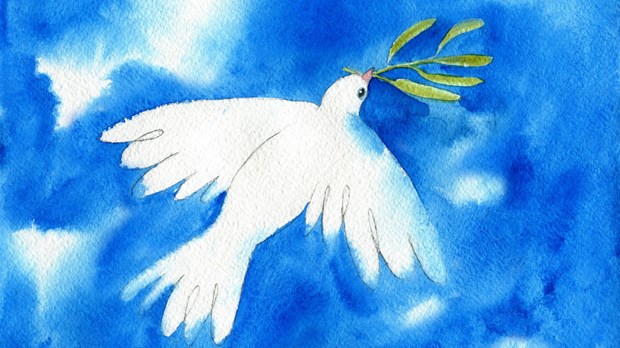That Present Bird

I attribute two things to keeping me faithful in college: Madeleine L'Engle and the Holy Spirit. At the time, if you would have asked me why I was still a Christian, I would have probably just attributed my continued belief to my friend Madeleine (as I liked to call her). The Holy Spirit was, to me, a mystery. I believed that God created and sustained, that Jesus saved and redeemed, but the Holy Spirit … I wasn't sure. I posted a quote from a Japanese gentleman L'Engle cited in A Circle of Quiet on the outside of my dorm room: "Honorable Father, very good. Honorable Son, very good. Honorable Bird I do not understand at all."
I agreed with this unnamed Japanese gentleman. Although I'd grown up in an evangelical household and church and attended a Pentecostal college for one year, the Holy Spirit seemed elusive to me. Issues of the Holy Spirit were relegated to the conversation about speaking in tongues—whatever conclusion your practical theology and experience led you to—and, of course, the fruits of the spirit sung to a short children's melody.
But one day, my last year in college, I took the sign off my door. I decided it was no longer true for me, that I was beginning to understand the Holy Spirit just a little bit. And it wasn't because I'd had a Pentecostal experience with tongues of fire and a rushing wind sound. It was because, somehow, amidst my collegiate confusion regarding who I was and who God wanted me to be, I'd begun to feel direction that I could attribute to no one but the Holy Spirit—not even my friend Madeleine.
The Holy Spirit in Scripture
In the Hebrew Scriptures, we hear a little about God's Spirit. It's mentioned as early as the second verse of Genesis: "the Spirit of God was hovering over the waters." This hovering was in the beginning, before God created anything. Later, the phrase "Spirit of God" is used in the context of prophetic words (Genesis 41, Numbers 24, 1 Samuel 10,11, and 19, and 2 Chronicles 14-15), artistic skills (Exodus 31 and 35) and prophetic visions (Ezekiel 11).
In the New Testament we read about how we can be led by the Spirit of God (Romans 8:14) and how the Spirit can live in us (Romans 8:9). As I've understood more and more about the Japanese gentleman's bird, I've re-interpreted how faith was described to me when I was a child. I'm like many Christians who first heard the gospel from her parents and accepted Christ at a very young age. At that time, the language about conversion usually involved the phrase, "to invite Jesus into one's heart." But upon a closer look at Scripture, it seems that what this language really means is that it is the third person of the Trinity who lives in us. Romans 8:9 reads, "You are not controlled by your sinful nature. You are controlled by the Spirit if you have the Spirit of God living in you. (And remember that those who do not have the Spirit of Christ living in them do not belong to him at all.)"
Looking back on my life now, I realize that it was God's Spirit drawing me to him as I sat on the back of that boat on the Potomac river reflecting about my life just several months before I took down the bird quote, that it was the Spirit (not my Christian parents) who taught me to pray and to remember God's presence in all that I do, that it was the Sprit, not fate or chance, who led me to my close friends and my husband, that it was the Spirit who helped me choose a college, apply for my job, and recover after two lost pregnancies in one year. So I've learned, that as I am God's daughter, and as I belong to Christ and follow Christ's example, the Holy Spirit lives in me and leads me.
In John's account of the last supper, Jesus promised the Holy Spirit to the disciples. "And I will ask the Father, and he will give you another Counselor to be with you forever—the Spirit of truth. The world cannot accept him, because it neither sees him nor knows him. But you know him, for he lives with you and will be in you" (John 14:16-17, NIV). In the King James version of the Bible, the Greek word paraclete, which is translated "counselor" in the NIV, reads "comforter." The literal Greek translation means, however, "one called alongside," which both counselors (both the legal and psychological variety, despite the legal connotation of "paraclete") and comforters do. However, in IVP's Dictionary of Jesus and the Gospels, we read that "The point is made both in Jesus' promise of 'another Paraclete of the same kind' … -supremely himself and the Father—so too the Paraclete will witness to and reveal especially the glorified son." In other words, relationally, the Holy Spirit picked up where Jesus left off after he ascended.
Another Paraclete
If I were a disciple of Jesus during his time on earth, then, what sort of relationship would I have with him? Hopefully, I would have allowed Christ to teach me. Jesus is considered by many to be the Great Teacher through his use of story and example.
Jesus told the disciples, too, how the Holy Spirit would teach them. For instance, in Luke 12:11-12, Jesus said, "When you are brought before synagogues, rulers and authorities, do not worry about how you will defend yourselves or what you will say, for the Holy Spirit will teach you at that time what you should say" (NIV). And again, in John 14:26, Jesus told his disciples, "But the Counselor, the Holy Spirit, whom the Father will send in my name, will teach you all things and will remind you of everything I have said to you." Here we see Jesus explaining the passing of the teaching baton from himself to the Holy Spirit.
Are you ever in a situation where you don't know what to say? Most often, I'm not. As a writer and performer, I usually find that words come easily to me. However, sometimes when I'm overcome with emotion—negative emotions—I also find it easy to say a lot. But it's the wrong lot, and too often I've said words I regret. Other times, if I have the opportunity to share my faith, I find that the words slow down and halt. In these times, I've prayed that the Holy Spirit would give me the words to speak, since either my words are the wrong words or I don't have any of my own. "Holy Spirit," I'll mutter under my breath or in my head if I'm engaged in conversation right there. "Give me the right words; show me what to say." It is a prayer I should pray more often.
Holy Spirit Power
In the New Testament, there is also an association between the Holy Spirit and power. We read stories about how the Holy Spirit comes upon someone and they are filled with, or given power (Luke 1:35, Acts 10:38, 1 Thessalonians 1:5). In Acts 1:8, before his ascension, Jesus told the disciples, "But you will receive power when the Holy Spirit comes upon you. And you will be my witnesses, telling people about me everywhere—in Jerusalem, throughout Judea, in Samaria, and to the ends of the earth." The Holy Spirit gives us power to be Christ's witnesses.
The Holy Spirit also gives us the power to be hopeful. In Romans 15:13, Paul wrote a blessing: "I pray that God, the source of hope, will fill you completely with joy and peace because you trust in him. Then you will overflow with confident hope through the power of the Holy Spirit." I don't know about you, but I don't usually think of hope as something that requires power. Maybe it requires naiveté or optimism, but power? Christian hope, however, does require power, because it is not a sentimental hope. In N.T. Wright's book Surprised by Hope, he reminds the reader, "Hope is what you get when you suddenly realize that a different worldview is possible, a worldview in which the rich, the powerful, and the unscrupulous do not after all have the last word." This type of hope isn't like hoping that it won't rain on your outing to the beach; it's hoping that the principalities and powers aren't that powerful after all. Without the Holy Spirit, this is pretty impossible to hope.
Holy Spirit Presence
About four months ago, my husband and I welcomed our first born daughter into the world, and I began to understand the Holy Spirit again, in a new way. Like many parents, I'm guessing, my imagination goes wild and I fear for my daughter's well-being, sometimes even when she's fast asleep in her crib. However, I've taken a lot of solace and hope in the continued presence of the Holy Spirit in my life. I pray for her every time I leave her, that God will keep her, that the Holy Spirit will reveal God to her, that she will be comforted by the Holy Spirit in her heart and mind, and that the Holy Spirit will draw her to the love of God.
We have a children's record that I listened to in the 1970s and that I now play for my daughter that reminds me of the presence and comfort of God. But when I hear it, I'm reminded of the presence of the Holy Spirit. "Safe am I," the old 1938 song goes, "Safe am I, in the hollow of his hands." The presence of the Holy Spirit makes God's presence real to us.
I wrote a prayer poem in college, about the same time I took the bird quote down. It quotes Genesis 1:2 as an epigraph. I pray that God will continue to work in me this way, that the Holy Spirit will continue to teach me, give me words, provide hope, and reveal God's presence—to my daughter and to me.
Hover over in me
Wind and Breeze,
Fire, Dove—
Inside my blood and breath
Let others know where and
How you are.
Joy-Elizabeth Lawrence is a graduate of Regent College in Vancouver, BC. She is a staff member at Calvin College and lives with her husband and infant daughter who is teaching her how to write with interruptions
Copyright © 2010 by the author or Christianity Today/Kyria.com.
Click here for reprint information.
Read more articles that highlight writing by Christian women at ChristianityToday.com/Women
 Read These Next
Read These Next
 Why I Teach Yoga, Pilates, and Tai ChiSharing God at the gym has strengthened my faith and stretched me in surprising ways.
Why I Teach Yoga, Pilates, and Tai ChiSharing God at the gym has strengthened my faith and stretched me in surprising ways.
 Kay Warren on Depression, Grief, and HopeChoosing joy "even if my worst nightmare came true"
Kay Warren on Depression, Grief, and HopeChoosing joy "even if my worst nightmare came true"








 Homepage
Homepage
